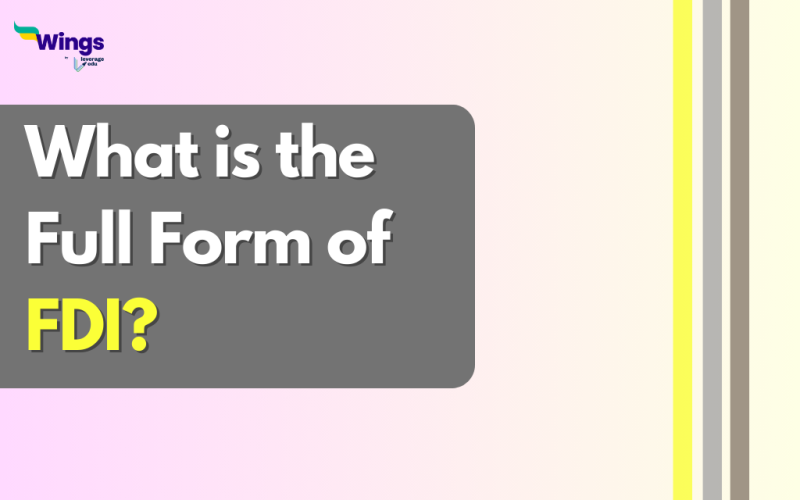FDI Full Form: FDI stands for foreign direct investment. It is the investment made in a company with a national base into an organisation with a national base. It differs from how a multinational investor invests in the stocks listed on a country’s stock exchange in terms of portfolio movement.
Simply put, direct investment is when an investor tries to influence or control a corporation in a certain country. In countries with open economies, strong potential for growth, and skilled labour, foreign direct investment is frequently made at relatively low costs.
Table of Contents [show]
FDI: Overview
An ownership stake in a foreign company or project is known as a foreign direct investment (FDI) and is made by a foreign investor, business, or government.
Typically, the phrase refers to a corporate decision to buy a sizable portion of a foreign company or to buy it altogether in order to expand operations to a new area. FDI is a crucial component of global economic integration since it forges strong, long-lasting ties between nations’ economies.
Target businesses or projects in open economies that have a trained workforce and above-average development potential for the investor are typically taken into consideration by businesses or governments seeking foreign direct investment.
The value of minimal government regulation is also common. FDI typically involves more than just capital expenditures. It might also entail the provision of management, technology, and tools.
The fact that foreign direct investment develops effective control over the foreign company, or at the very least significant influence over its decision-making, is one of its key characteristics.
Types of FDI
The following categories are frequently used to classify foreign direct investments:
- A company establishes the same kind of business operation in a foreign nation as it does in its own using a horizontal FDI. An illustration would be a U.S.-based cell phone company purchasing a Chinese chain of phone shops.
- A company purchases a complementary company in another nation through vertical FDI. For instance, a US business may buy stock in a foreign firm that provides it with the raw resources it requires.
- A corporation invests in a foreign company that is unrelated to its main business in a conglomerate FDI. This frequently takes the form of a joint venture because the investing business has no prior experience in the field of expertise of the foreign company.
- Platform FDI is a type of FDI in which a domestically based business extends abroad, but the output from the overseas activities is exported to a third country. For instance, platform FDI can apply if Honda buys the Irish manufacturing facilities to export automobiles to other countries.
Examples of FDI
Now that you are familiar with the definition and categories of FDI, let’s move on to some real-world instances.
- Fab India, an Indian business that creates goods comparable to Zara, might be purchased by or invested in by a Zara with headquarters in Spain. The FDI classification is horizontal FDI because both businesses are involved in the same sector of the clothing and products industry.
- Nescafé, a Swiss coffee manufacturer, is able to make investments in coffee farms in nations like Brazil, Colombia, and Vietnam. Backward vertical integration is the term used to describe this type of FDI since the investment business purchases the suppliers in its supply chain.
- As a conglomerate FDI, US retailer Walmart is permitted to participate in Indian manufacturer TATA Motors.
- The French perfume company Chanel, which falls under the FDI platform, has constructed production facilities in the United States and exports its goods to the United States, Asia, and the rest of Europe.
Advantages of FDI
FDI has a number of benefits, some of which are highlighted here.
- It produces jobs for the nation.
- It brings new capital into the country.
- Expands the nation’s forex role
- It brings new technologies and expertise to a country.
- It boosted prosperity and raised tax receipts.
- It gives the investing company access to a country’s foreign market. If the international target market has lower salaries, the investing company may be able to cut production costs.
- The investor corporation is permitted to utilise a nation’s natural resources, including metals, fossil fuels, and other things.
Disadvantages of FDI
- Foreign investment can be risky due to exchange rate fluctuations;
- It also depends on the constantly shifting political climate, foreign policy, and regulations of the nation;
- Domestic companies may lose control of their operations and profits;
- The desire to gain market share through foreign investment can result in significant losses for domestic and small traders.
Conclusion
FDI (full-form Foreign direct investment) benefits emerging nations. There are, nevertheless, certain possible hazards. Negative selection and distressed selling may result in catastrophe. The advantage’s genuine benefits may be limited by leverage.
Furthermore, a large proportion of foreign direct investment compared to total capital inflows may indicate institutional weakness rather than strength. For developing nations, policy recommendations are required to enhance both the domestic and international investment climate.
Must Read: What is the Full Form of IOC?
Must Read: What is the EAMCET Full Form?
Hope you got all the information that you were looking for related to the FDI full form. Don’t miss out on checking out our alphabetically arranged 300+ full-form list here! Enjoy reading!
 One app for all your study abroad needs
One app for all your study abroad needs















 45,000+ students trusted us with their dreams. Take the first step today!
45,000+ students trusted us with their dreams. Take the first step today!
